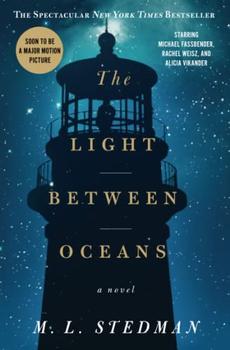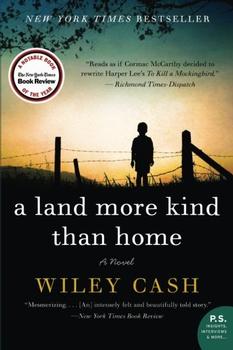Summary | Excerpt | Reading Guide | Reviews | Beyond the book | Read-Alikes | Genres & Themes | Author Bio

Sibling relationships are interesting to ponder. The connection has the potential for being one of the most enduring — and yet, offers no choice regarding its inception. There are no guarantees that siblings will be compatible or have similar interests. There could be an enormous age and maturity divide, and yet you are expected to work together. Even if you might not have anything else in common, a brother or sister understands your strengths and weaknesses. Siblings are likely to know your trigger points for both joy and despair. And even if you are headed in different directions, they know best where you have come from.
Past the Shallows introduces us to three brothers living on the coast of southern Tasmania with their volatile father, an abalone fisherman. Nineteen year-old Joe, the oldest, has left home and plans to leave town completely. Miles, although only thirteen, is forced into working on the boat with his father. He knows he won't be allowed to attend school much longer. Nine year-old Harry, the youngest, is prone to seasickness and has an intense fear of the water, so he is often left on his own to explore and search for treasures on the beach and in the woods. Told from the dual perspectives of Harry and Miles, the story reveals the three brothers' shared secrets and their furtive, desperate hopes for the future.
The boys experience moments of beauty and simple pleasure: catching a wave while surfing; sharing a meal made from the last bits of food in the pantry; looking ahead and hoping for a time when things will be better. Harry, as the youngest and most naive, is the best at discovering joy wherever he goes. When he finds twenty bucks, he is delighted to buy treats for his brothers and best friend. When he meets George, a disfigured man living in the nearby woods, he is open-hearted enough to make a connection despite having been warned to stay away. Ultimately, George provides a safe haven, and perhaps even more important, acts as catalyst for Harry's repressed memories to surface.
As Miles says, "Harry had a way about him. A way that made you promise to take care of him." However, taking care of Harry isn't easy. Life is hard and unpredictable. Their father is struggling to get by. The bank owns his dilapidated boat and debt collectors are hounding him. A bad night of fishing means another week of scrounging. The boys have already experienced great loss. Miles in particular feels older brother Joe's absence. Most significantly, their mother is gone, having died in a car accident—a tragedy that no one is allowed to speak of.
As the middle son, Miles is caught, well...in the middle. Dreading a future trapped on the boat, he wishes he could escape with Joe, but knows he can't leave Harry to fend for himself against their father's increasingly worsening temper. And besides, despite moments of frustration and resentment, his little brother is a bright spot for Miles. Their relationship feels authentic and true; full of both annoyance and adoration that is common between siblings. Having more experience with their father's rage, Miles has developed strategies for keeping the peace, for staying out of harm's way. But like the storms building in the background, things get worse. As secrets that have been long buried start to surface, we know we are headed into a dark and threatening place.
There is a lyrical quality to Parrett's writing. Although told in stunningly clear—almost simple—and straight-forward prose, the story holds a poetic sensibility. Each word matters. The flow of the sentences echoes the rhythm of the ocean. Beneath the beautiful surface lies danger and risk. As Miles describes when looking over the edge of the boat:
Below in the murky darkness, in the swirling kelp, all you had to guide you was one hand touching the rock wall while your legs kicked you down blind. And that's where they were, the abalone. Down where the algae grew thick...And there were caves and crevices, places to get stuck. Places where the air hose could get snagged.
And like the ocean, the story too, with its melancholy tone, holds more than is first seen. It seems as though each scene is both worrisome and soothing. The high moments are laced with a bit of a worry. Wonder is quick to follow danger and threat. From the start, I knew we were on unsteady ground. Something ominous looms in the background against the stark yet beautiful landscape made clear with just the right details. And yet, I was surprised by the harsh intensity of the climactic scenes. The ending was shocking, yet felt unfortunately inevitable too.
Although there are tough issues - grief, alcoholism, abuse and poverty-presented, this is not what I would consider a dark and brooding book. Hope is woven in within the sad and difficult times. Made up of small and often quiet moments, this is a surprisingly complex story.
![]() This review
first ran in the May 7, 2014
issue of BookBrowse Recommends.
This review
first ran in the May 7, 2014
issue of BookBrowse Recommends.

If you liked Past the Shallows, try these:

by Margot L. Stedman
Published 2013
A captivating, beautiful, and stunningly accomplished debut novel that opens in 1918 Australia - the story of a lighthouse keeper and his wife who make one devastating choice that forever changes two worlds.

by Wiley Cash
Published 2013
A mesmerizing literary thriller about the bond between two brothers and the evil they face in a small western North Carolina town.
Your guide toexceptional books
BookBrowse seeks out and recommends the best in contemporary fiction and nonfiction—books that not only engage and entertain but also deepen our understanding of ourselves and the world around us.